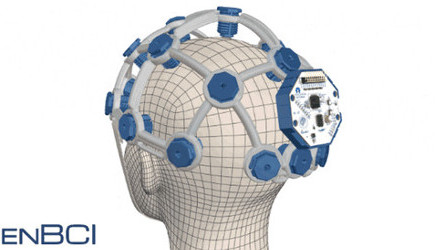Develop Mind-controlled Devices With OpenBCI
November 12, 2015
on
on

OpenBCI, the open source Brain Computer Interface platform, started in 2013 to make biosensing available to makers, researchers and biohackers. Now the OpenBCI team has launched a new crowdfunding campaign to further lower the barrier to entry with an even cheaper OpenBCI platform and a new 3D printed headset.
The development of brain wave capturing and reading should not be in the hands of corporations and well-funded research institutes alone, said Joel Murphy and Conor Russomanno when they ran their first OpenBCI Kickstarter campaign late 2013. To open up innovation to anyone who is interested in brain computer interfacing they developed OpenBCI.
The OpenBCI platform measures the electrical signals of the human body that can then can be used to control an external device. In the video below OpenBCI contributor Chip Audette controls a Hexbug Spider robot with his mind.
Raising over $200.000 early 2014 and having since worked with researchers and tinkerers from Montreal to Tel Aviv, OpenBCI has been a success. However, Murphy and Russomanno noted the platform is still mostly used by professionals in the field. To make BCI even more accessible they are now running another Kickstarter to lower the cost and improve the platform.
They are crowdfunding the Ganglion Board and the Ultracortex Mark IV headset. The Ganglion is an open source Arduino-compatible board that can measure brain waves and heart and muscle activity. It is the follow-up of the original OpenBCI 32bit Board.
The Ultracortex is a 3D printable headset to measure EEG signals. The Mark IV is still under development but the Mark III is available as a kit in the OpenBCI shop or as printable files at Github. The Mark IV as well as the Ganglion board are available on the new Kickstarter campaign and will ship July 2016.
Image: Concept design of the Ultracortex Mark IV headset with the Ganglion board in the back. By OpenBCI.
The development of brain wave capturing and reading should not be in the hands of corporations and well-funded research institutes alone, said Joel Murphy and Conor Russomanno when they ran their first OpenBCI Kickstarter campaign late 2013. To open up innovation to anyone who is interested in brain computer interfacing they developed OpenBCI.
The OpenBCI platform measures the electrical signals of the human body that can then can be used to control an external device. In the video below OpenBCI contributor Chip Audette controls a Hexbug Spider robot with his mind.
Raising over $200.000 early 2014 and having since worked with researchers and tinkerers from Montreal to Tel Aviv, OpenBCI has been a success. However, Murphy and Russomanno noted the platform is still mostly used by professionals in the field. To make BCI even more accessible they are now running another Kickstarter to lower the cost and improve the platform.
They are crowdfunding the Ganglion Board and the Ultracortex Mark IV headset. The Ganglion is an open source Arduino-compatible board that can measure brain waves and heart and muscle activity. It is the follow-up of the original OpenBCI 32bit Board.
The Ultracortex is a 3D printable headset to measure EEG signals. The Mark IV is still under development but the Mark III is available as a kit in the OpenBCI shop or as printable files at Github. The Mark IV as well as the Ganglion board are available on the new Kickstarter campaign and will ship July 2016.
Image: Concept design of the Ultracortex Mark IV headset with the Ganglion board in the back. By OpenBCI.
Read full article
Hide full article


Discussion (0 comments)